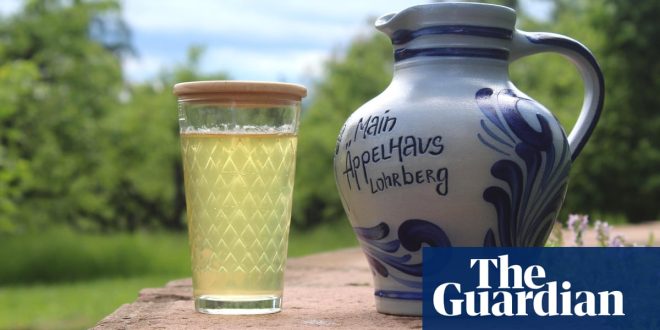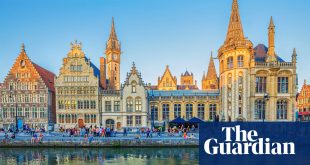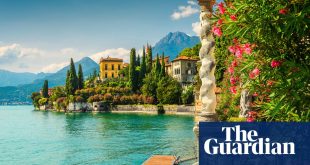I am sitting in Atschel, a cosy, if crowded Apfelweinwirtschaft (apple wine tavern) in Sachsenhausen, south of the River Main from Frankfurt’s central Römerberg plaza. Germany’s financial capital is one of the host cities for Euro 2024, and such taverns, and their leafy gardens, will be heaving during the competition.
England play Denmark here on 20 June, while Germany face Switzerland three days later. This is a nation renowned for its beer quality, of course, but those visiting Frankfurt for the football will find that here, another drink rules: Apfelwein.
This traditional Hessisch cider – the beverage of the state of Hessen – is dry, still, unfiltered and is made from sour apples, making it taste tart. Many locals top it up with sparkling water, diluting the flavour, dampening the 5-7% alcohol and making the beverage particularly refreshing on hot days. Hardcore Sachsenhauseners drink Apfelwein pure.
Atschel is bustling with locals, young and old, squished together on communal benches. A large grey jug, decorated with floral blue artwork, is soon plopped on the table before me. It is called a Bembel and it is an icon of Frankfurt, exclusively used to serve Apfelwein – or Ebbelwoi as it is called in local dialect. Bembels line the shelves and hang above the bar. This Bembel is an Achter (eight-er), meaning it contains enough apple wine to fill eight Gerippten; the 0.3-litre, diamond-patterned glasses in which the drink is served. The ribbed design makes the liquid gleam in the light (and makes it easier to grip after eating a greasy sausage).
I’ve come to Atschel to meet Apfelwein historian Stefan Krämer, a large, friendly man with a full, white beard and encyclopaedic knowledge of local history. After pouring a drink, Krämer covers his glass with a Schoppedeckel – a wooden lid to protect it from insects (and sloppy speakers).
Frankfurt is obsessed with Apfelwein. While London has the Gherkin, the city’s novelty skyscraper is das Gerippte – a 110-metre-high (360ft) apple wine glass overlooking the Main. On my way to Atschel I see pottery shops stacked floor to ceiling with Bembellen and pass a shrine to Adam and Eve with apple and Gerippten in hand. Spruce wreaths hang above the cobblestone streets and doorways of half-timbered houses, identifying an Apfelweinwirtschaft to those in the know.
Krämer wears a jumper stating “My favourite beer is apfelwein”. One of his friends, Jens, arrives to join us on a scooter decorated like a Bembel, with a Gerippte embroidered on the seat.
“In most cities you get the same drinks; the same beer, the same glasses,” Krämer says. “That’s why I preserve these traditions. I don’t know exactly how many Bembels I have. Maybe 300.”
Grape wine ruled in Frankfurt until the end of the 15th century, when the little ice age and grape phylloxera made its production unviable. Producers who had been making Apfelwein for personal consumption, particularly in orchard-rich Sachsenhausen, stepped in to fill the void. By the 16th century, locals were serving apple wine in their front rooms and, by 1641, the wreaths that still hang above many taverns today became mandatory, so the tax collectors could take their cut.
“It was the wine of the working class,” adds Krämer. By 1750, he tells me, 1m litres of Apfelwein were being served each year in Sachsenhausen alone. During the 1800s, these living-room pubs became the taverns and gardens you can visit today.
Apfelwein production was banned during both world wars as apples were repurposed, and much of Frankfurt was destroyed in the second world war. Many old taverns were rebuilt, but most locals now buy their apple wine from industrial suppliers rather than making it themselves. Most, but not all.
I visit Zur Buchscheer, an Apfelweinwirtschaft that has been in operation since 1876. The tavern sits on the edge of the huge city forest in outer Sachsenhausen, and is a popular watering hole before Eintracht Frankfurt football matches – with the stadium nearby.
Robert Theobald is the fifth generation owner of the tavern and makes about 60,000 litres of Apfelwein each year. You can see the belt press as you walk in. “This is homemade cider,” he says, handing me a ribbed glass. “I’m a little bit proud of it. It’s really local. It’s a tradition that you can drink.” Theobald’s Ebbelwoi is light and refreshing, even without water.
Back in central Sachsenhausen, I find another homemade cider at Daheim im Lorsbacher Thal, where Frank Winkler is bringing an elegant touch to the traditional apple wine tavern. Bembels, geripptes and pictures of winemakers remain; but on polished dark wood floors.
after newsletter promotion
Daheim serves more than 300 ciders. Its cellar is part museum, part laboratory. Wooden casks are punctuated with experimental fermentations, sold upstairs. “We use different mixes of apples, different yeasts and we have ways of moving the acidity higher or lower,” he says.
Winkler puts an equally big focus on local food – from traditional green sauce (a mix of seven local herbs) with hard boiled eggs to Handkäse mit Musik: sour cheese topped with onions.
Like most Apfelwein joints, Daheim has communal tables. “After Covid, the younger generation rediscovered these old, traditional places where you can meet and have fun. It’s a social thing; a counterpart to the cold, digital lifestyle.”
Just around the corner from Lorsbacher Thal, I meet Jens Becker in Apfelweinhandlung JB. This was the first speciality cider shop in Germany when it opened in 2008. “My grandfather produced Apfelwein in this area,” he says. “And my wife is from a family producing cider.” Becker noticed a decline in Apfelwein consumption – “fewer trees, fewer producers, a smaller target market” – and opened his shop to give artisan producers somewhere to sell in the city.
“Before I opened, nobody in Frankfurt would dream of buying Apfelwein as a present for somebody,” he says. “This is a revival; a restart.”
Becker shows me a poster from 1912 for Apfelwein champagne, and says “tradition is also storytelling”. Becker has a small museum of Gerippten but serves me his own Apfelwein in a wine glass. “This is everybody’s darling,” he says. “A cuvée.” It is delightful; reeking of honey.
Becker hosts Apfelwein tastings, and over the road at ApfelweinKontor – in the oldest half-timber house in Frankfurt – 36-year-old Josef Grunenberg has made a business of doing the same.
Grunenberg shares the building with Dayanna Moya (ArtBembel), who hand paints intricate bembels on site. When I arrive, a group of 30 is in the middle of a tasting. Grunenberg, who wears a silver bembel necklace, runs up and down the wooden stairs, imparting wisdom.
On my final day in Frankfurt, I am keen to see an orchard for myself. I head to MainÄppelHaus Lohrberg, a community-run orchard on Frankfurt’s local wine hill. It is a 90-minute, fiercely uphill walk from my hotel in the heart of the city. On arrival, I order ein Ebbelwoi, bitte and forget to pop my Schoppedeckel on as a fly quickly drops into my glass. Families stroll around the vines and flowerbeds. I grab a grilled sausage, sit in the greenery and look out over the skyline.
“Frankfurt is a city of love at second sight,” my tour guide, Tommy Jepp, had told me. It may not be a place of immediate beauty; but scratch the surface and you’ll find green havens and eclectic cultures waiting to welcome you in, often beneath spruce wreaths, with ribbed glasses.
Accommodation was provided by Flemings Selection Hotel Frankfurt-City; doubles from €118 (£100) a night
 Top Naija News – Nigeria News, Nigerian News & Top Stories Top Naija News – Nigerian Newspapers, Nigerian News. topnaijanews is a daily Nigerian newspaper covering Latest News, Breaking News, Entertainment, Sports, Lifestyle and Politics.
Top Naija News – Nigeria News, Nigerian News & Top Stories Top Naija News – Nigerian Newspapers, Nigerian News. topnaijanews is a daily Nigerian newspaper covering Latest News, Breaking News, Entertainment, Sports, Lifestyle and Politics.




